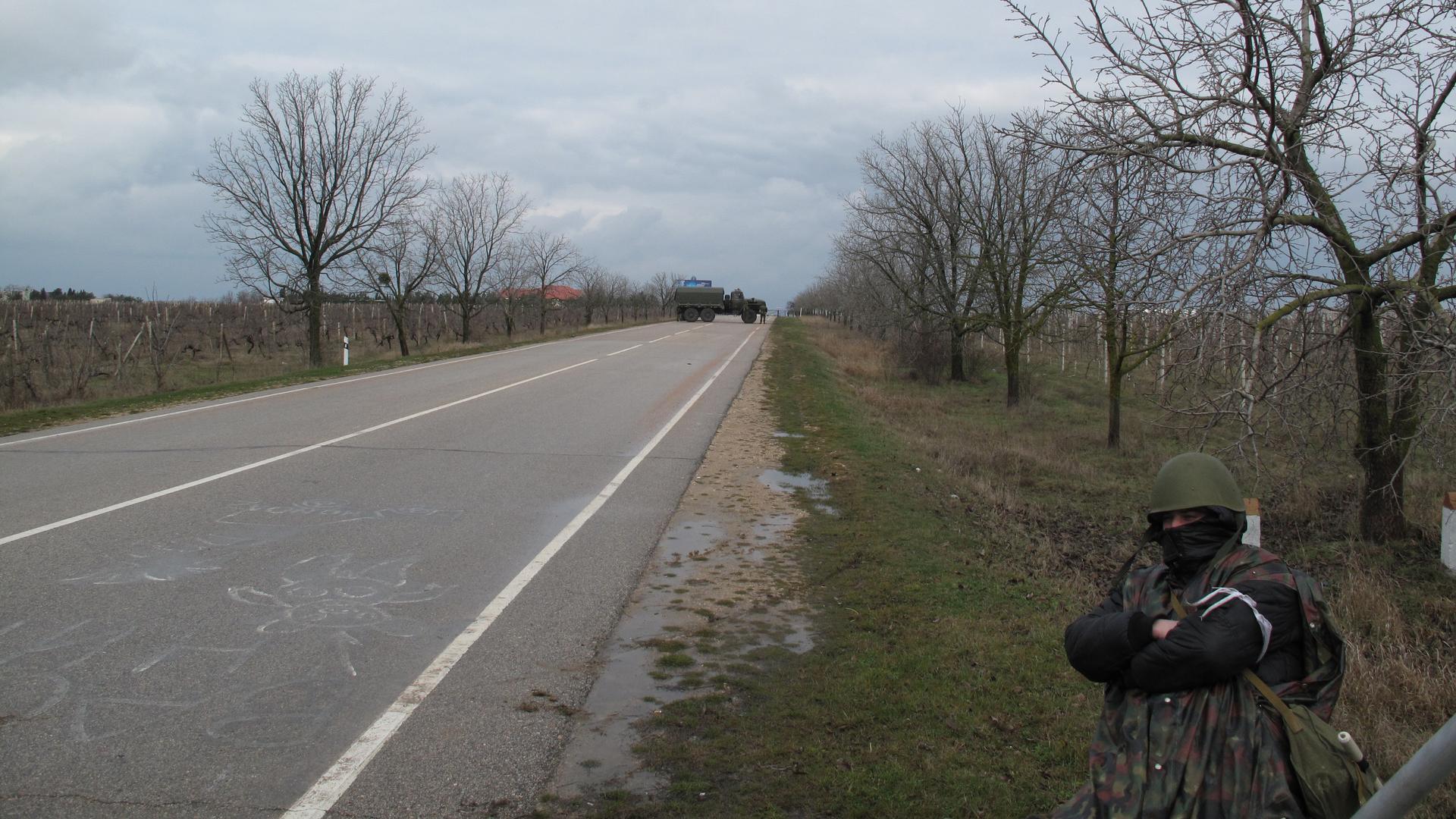Mystery troops blockade airports in the Crimean region of Ukraine
A militia man stands guard at a checkpoint Friday about a hundred yards from unmarked military trucks that have sealed off Sevastopol’s airport.
A de facto partition of Ukraine appears to be taking place. Pro-Russian elements are stepping up their opposition to the new government of Ukraine and there is evidence that suggests regular soldiers from Russia are intervening as well. Top Ukrainian officials are talking about an "invasion."
Late Friday afternoon, President Barack Obama made a brief statement where he warned Russia that any military intervention would be met with unspecified consequences. But a short time later, unnamed US defense officials told various media outlets Russian troops had been seen in Crimea. Ukrainian officials claimed, according to AFP, that 13 planes with 2,000 Russian troops had landed in Crimea — but there was no independent confirmation of that claim.
(Get updates on the developing situation in Ukraine from The Guardian's live blog.)
Ousted president Viktor Yanukovych resurfaced Friday after a week on the run. At a press conference just across the border in Russia, he denounced what he called the coup that drove him from power last week and insisted he was still president and commander of the Ukrainian armed forces. The new government in Kiev has issued an arrest warrant for Yanukovych, in connection with the killing of dozens of protesters. It has also accused him of being willing to sell out the nation's a sovereignty — a reference to his close ties with Moscow.
The Ukrainian parliament has also moved to end the status of Russian as one of the official languages of Ukraine. Ukraine has a large minority of people that self-identify as Russian, anything between 1/5th and 1/3rd of the population. Most of these people live in the south and east of Ukraine. Russian media has denounced the regime change as a fascist coup, and many Russian-speaking Ukrainians seem to agree, says reporter Jacob Resneck. Resneck is in Sevastopol, the main city in the heavily Russian region of Crimea.
Crimea was actually part of Russia until 1954.
Armed men set up roadblocks and checkpoints across much of Crimea on Friday. Resneck went to one near Sevastopol International airport. "It was quite interesting," he says. "In the distance, about 50 yards away we could see green military trucks parked through the two lanes and blocking everything, and there was about seven or eight heavily armed troops standing outside."
Resneck says they were clearly professional soldiers. The soldiers and the trucks looked just like the Russian ones you can see driving around Sevastopol, which is home to a large Russian military base, and home to Russia's Black Sea Fleet. However, says Resneck, the soldiers wore no insignia. Nor did the vehicles, and no license plates. Moscow says any activity is consistent with its existing security agreements with Ukraine.
The soldiers were cooperating with cheerful unarmed civilian volunteers in paramilitary kit, who were manning separate barricades a short distance from the professional soldiers. These were flying the flag of the "Russia Bloc" a pro-Russian Ukrainian political party. When journalists asked what would happen "if we hopped your little barricade and tried to go talk to the soldiers," the volunteers said "they'll probably shoot you."
The airport is also home to a Ukrainian government army unit, but these troops do not appear to be the ones manning the blockades.
Flights to Crimea from Kiev have been cancelled due to what Ukrainians say is the 'closure' of Crimean airspace. However, other flights seem to be operating.
Despite all this, Resneck say there is no tension in Sevastopol. "People here probably 85 to 90 percent self-identify as ethnic Russian, (so) these actions seem to have a lot of popular support. So there isn't any visible friction," he says. "There's a lot of pro-Russia rallies almost every night and the Russian flag is flying on most buildings. It's pretty rare to see the yellow and blue national Ukrainian flag … so I would say tension is almost completely absent."
Resneck says Ukraine does not have a strong security or military presence in Crimea, so it would be difficult for Kiev to try to wrest back control of the region. Now, he says, "it feels like you're in a Russian city."
Every day, reporters and producers at The World are hard at work bringing you human-centered news from across the globe. But we can’t do it without you. We need your support to ensure we can continue this work for another year.
Make a gift today, and you’ll help us unlock a matching gift of $67,000!
